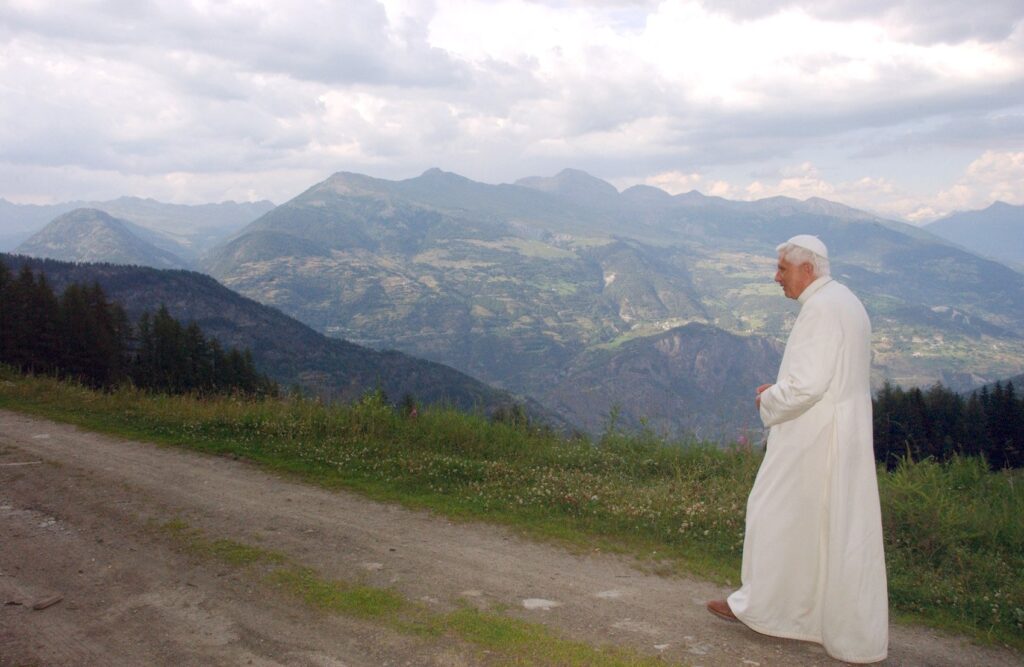
Remembering, and Missing, Pope Benedict XVI
By: Our Sunday Visitor
Pope Benedict lived in surrender to Christ and can help us to better surrender to him

A year out from his death, I dearly miss Pope Benedict XVI. He was the pope of my coming of age. The generation of priests above me feel this way about Pope St. John Paul II; older priests, Pope St. Paul VI and Pope St. John XXIII.
When I started paying attention to my faith in high school, I was formed by Pope Benedict’s theology and speeches. I remember vividly his election and his words to the Church in his first homily as pope. And I remember that homily because he asked a question that every believer needs to face.
— A matter of surrender
What did he say that has stuck with me all these years? Pope Benedict asked: “Are we not perhaps all afraid in some way? If we let Christ enter fully into our lives, if we open ourselves totally to him, are we not afraid that he might take something away from us? Are we not perhaps afraid to give up something significant, something unique, something that makes life so beautiful? Do we not then risk ending up diminished and deprived of our freedom?”
Christianity is a matter of surrender. Surrendering is a lesson we need to learn over and over again. We must continually give ourselves to Christ to renew our trust in him. Pope Benedict lived in surrender to Christ and can help us to better surrender to him.
For Pope Benedict, that journey of surrender began in the liturgy. He recounted to the journalist Peter Seewald being greatly interested in what happened at Mass, including his delight in using a missal — beginning in the second grade — to explore the Latin liturgy. He called it, “a voyage of discovery.” Elsewhere, Pope Benedict likened the liturgy to play. He said, “Play is a kind of other world, an oasis of freedom, where for a moment we can let life flow freely.” The liturgy wasn’t oppressive for him, it was supremely liberating. A relief from the cares of the moment, allowing his heart and mind to be given over to the work of Christ.
–Freedom through the liturgy
That discovery of Christ is open to us all in our worship. All of us need that freedom from the worries that trap and ensnare us in the moment. To have our anxieties soothed and our worries calmed and our anger quenched — even if just for the duration of a Mass. But the more we give ourselves over to the freedom of the liturgy, the more we will find that freedom begins to rule our life. And bit by bit surrender to Christ comes with more and more ease.
The other great aid for Pope Benedict was the intellectual life. Growing up in Nazi Germany, he remembers everyone being defined and categorized. It was no secret that he wanted to be a priest, and in a hostile climate he had to learn to defend himself. “By itself studying theology doesn’t make a person better,” Pope Benedict admitted to Seewald. But, he continued, “It helps to make him better when he doesn’t pursue it just as a theory but tries to get a better understanding of himself and of man and the world as a whole in what he reads and then tries to appropriate it as a form of life.” Precisely because he understood theology as a form of life, Pope Benedict’s mind was given to Christ.
For Pope Benedict, Christianity couldn’t be abstract or theoretical. Christianity is an event, a reality. Christ is a person to be known with the mind and loved with the heart.
In the end, the pope was right. “If we let Christ into our lives, we lose nothing, nothing, absolutely nothing of what makes life free, beautiful and great.” And it is this that I am most grateful for, the way he helped me to let Christ into my life.
It’s a curious thing to feel so attached to someone I never met, but then again our heroes shape us.
– – –
Father Patrick Briscoe, O.P., is a Dominican friar and the editor of Our Sunday Visitor.

